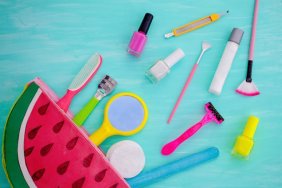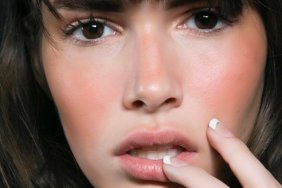When we have a problem, it’s not just what we do, it’s what we don’t do. It especially rings true for beauty and skin concerns, like body acne. There are different options for treating body acne and different ways to fade post-acne marks. If you’ve struggled with buttne, bacne or zits on any part of your body, these mistakes could be making your acne worse. Making simple switches could lead to fewer breakouts and who doesn’t want that?
Let’s start off with the basics. Dr. Iris Rubin, dermatologist and co-founder of SEEN hair care, says body acne is formed in the same way pimples are on your face. Body acne is the result of pores getting clogged by sebum (skin’s natural oil) and dead skin cells. There’s also a certain type of bacteria that lives on skin, C. acnes (formerly P. acnes), that can get into your pores and cause inflammation.
Co-founder of BIA Life Dr. Shasa Hu says that body acne is exacerbated by sweat, humidity and friction from fabrics or repetitive body movements, which is why pimples are commonly seen on the upper back and bum. There are several other things that are big no-nos.
Wearing Tight Clothes in Heavy Fabrics That Don’t Breathe
Here’s a legitimate reason to buy that breezy dress or boxy shirt you’ve been coveting. Board-certified dermatologist Dr. Amanda Doyle says clothing can exacerbate acne in hot weather. Clothing can trap sweat, oil and bacteria and lead to breakouts. Things get worse the tighter and less breathable a garment is. Hu says clothes that have been chemically treated with wrinkle-resistant finishes or dry-cleaned can worsen acne.
New York City dermatologist Dr. Joshua Zeichner recommends wearing moisture-wicking fabrics rather than cotton when working out since cotton can trap wetness and tends to stick to skin.
Staying in Sweaty Clothes
There are a few reasons to hit the shower and change post-workout. Doyle says staying in sweaty clothes allows bacteria and oil to sit on your skin and stimulate acne production. Ick. If you have no time to shower, use a no-rinse body wash or wipes before changing into fresh clothes.
Using the Wrong Hair and Skin Products
Rubin explains that one of the biggest mistakes people make is not realizing their skin and body products can cause body acne. So check the labels of all of your products to see if they’re noncomedogenic. It may seem obvious for skin and body products, but hair products are equally important.
“What’s on your hair is on your skin,” says Rubin. “Shampoo and conditioner rinse down the face, chest and back in the shower and leave-in styling products by design leave a residue that can transfer from hair to skin or from pillowcase to skin.” Having long hair means that residue will touch the skin on your shoulders and back all day long.
Using Fabric Softeners and Dryer Sheets
Fabric softeners and dryer sheets may improve a load of laundry, but they can cause skin problems. Dermatologist and founder of Epionce Dr. Carl R. Thornfeldt explains that both items produce a waxy residue that can be left on your skin and lead to acne.
Performing Self-Extractions
We’ve been told not to pick pimples on our faces countless times and the same rule applies to the rest of our bodies. Hu says picking can make the problem worse, especially if you’re squeezing pimples and they pop under your skin. Improper self-extraction can result in discoloration and permanent scarring.
Using Loofahs, Bath Sponges or Harsh Exfoliators
Loofahs, brushes and bath sponges harbor bacteria and contribute to body acne, according to Thornfeldt. Scrubbing your body with harsh materials can damage the skin barrier and lead to inflammation in the form of body acne. The same goes for harsh physical scrubs (like those with walnut shells) per Hu. She says being thorough with scrubs won’t “unclog” pores. In reality, it can compromise the skin barrier and cause micro tears. This can make body acne worse because it sets your skin up for potential infections.
Taking Long Showers
We’ve discovered why we shouldn’t wash our faces in the shower. Now, Hu says taking long or hot showers can make body acne worse by stripping skin’s natural oils. This can result in the overproduction of sebum as skin tries to restore the balance.
Applying Heavy or Oil-Based Beauty Products
Oil can clog pores. So Rubin warns to watch out for comedogenic (aka pore-clogging) oils, like coconut oil, wheat germ oil and cocoa butter. And don’t assume that oil-free products are less likely to clog pores — remember to look for that all-important noncomedogenic label. She recommends avoiding thick, heavy ointments or creams that are occlusive (prevent water loss) because they can clog pores.
Eating Certain Foods
Time to reconsider that junk food run. Eating highly processed foods, dairy or foods high in sugar can sometimes trigger acne, according to Doyle. Rubin confirms that there is evidence that certain dairy products, particularly skim milk, plus high glycemic index foods, like carbohydrates, may be associated with acne. Healthier modifications made a difference in some patients. Doyle cautions that if you decide to give up dairy, you need to ensure you’re getting an adequate amount of vitamin D.
Working Out in Hot, Steamy Environments
Love hot yoga? It may make you feel good, but it may be the reason you’re breaking out. Hu says intense workouts in hot environments (outdoor CrossFit, power yoga, hot jogs, etc.) can make body acne worse if people aren’t showering right after the class and changing into breathable clothing. Workouts that require lots of repetitive movements (like cycling and rowing) can lead to friction and pimples.








